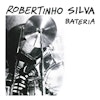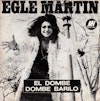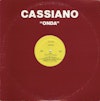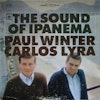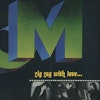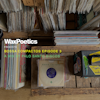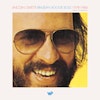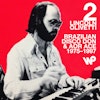“He could read a newspaper and sound good,” Miles Davis famously said of the wafer-thin-voiced bossa nova originator, João Gilberto. While Gilberto credits his singing style to Chet Baker’s breathy vocal sides, this soft, almost whisper-like bossa nova affect he helped to institutionalize has influenced vocalists in Brazil and beyond from Caetano Veloso and the best Erasmo Carlos albums to Elliott Smith and contemporary Brazilian vocalist and producer Bruno Morais.
The title of Bruno Morais’s first official album, A Vontade Superstar, roughly translates to “The Superstar Will,” where the cover depicts a mild-mannered business-suited cartoon man flying diagonally across the LP jacket. The package is a fitting one, in that Morais’s debut sounds like Clark Kent doing bossa nova and MPB (catchall term for post-bossa, Brazilian highbrow pop music) with an occasional peak of the superhuman vocalist, songwriter, and producer hiding beneath this timid set of songs. A Vontade Superstar delivers nearly weightless and intimate vocals over “Mack the Knife”-meets-Macumba rhythms. The album is generally pleasant and very listenable with Morais’s seductive vocals carrying most of the songs except for a few, particularly the final two, “Do Inferno” and “Há de Ventar,” where more dynamic and intense instrumentation bolster Bruno’s vocals, elevating the songs.
Just as João Gilberto sang from the shoulders of bossa nova songwriters and lyricists Tom Jobim, Vinicius De Moraes, and Carlos Lyra when recording his definitive takes, Bruno’s most memorable songs come from a 2011 collaboration with the Afrobeat-inspired instrumental group Bixiga 70, an original, “Ela e Os Raios,” and a heavenly cover of Erasmo Carlos’s little-known ballad “Sorriso Dela.” Bruno’s vocal on the song channels Erasmo’s understated intensity and vulnerability while Bixiga’s arrangement breathes new life into this beautiful tune by marrying the jazz sophistication of Brazilian master Moacir Santos with Fela Kuti’s horns and polyrhythms.
“When you talk about being a singer-songwriter,” Bruno muses, referring back to Erasmo, “that’s the kind of singer-songwriter I want to be.” This sentiment is encouraging, as Bruno’s weakest link is in the depth of his songwriting. But Bruno’s more Wolverine than Superman; he’s clearly endowed with an extraordinary voice, but he truly shines when matched with equally stellar songs and dynamic arrangements. Bruno’s musically promiscuous, playing with lots of partners, making musical love connections for others (he introduced key members of what would become Bixiga 70), continuing to refine and evolve his sound and aesthetic, as one can hear just from the few singles released since A Vontade Superstar. With Saint Erasmo inspiring his songcraft and talented coproducers Guilherme Kastrup (from Bruno’s band) and Mauricio Fleury (from Bixiga 70) filling out the musical vision, we can expect Bruno’s sophomore album to sound at least as good as the New York Times set to Afrobeat polyrhythms.

